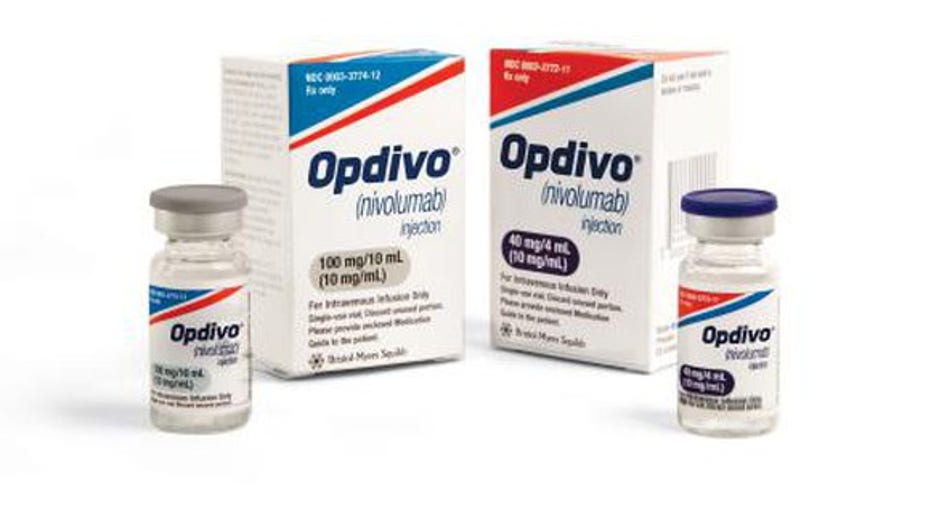This Crushing Blow Sent Bristol-Myers Squibb Co. Down 23% in August

Image source: Getty Images.
What happened
Shares of Bristol-Myers Squibb (NYSE: BMY), a global drug developer focused on the development cancer, cardiovascular, and genetic-defined disease drugs, plunged 23% in the month of August according to data from S&P Global Market Intelligence. The reason for Bristol-Myers' dismal performance can be traced to the top-line release of its CheckMate-026 data on Aug. 5.
So what
Bristol-Myers Squibb's CheckMate-026 trial was expected to be just as successful as every other trial the company had run with its cancer immunotherapy Opdivo. Unfortunately, that proved not to be the case. CheckMate-026 was designed to examine Opdivo as a monotherapy in patients with previously untreated advanced non-small cell lung cancer (NSCLC) whose tumors had PD-L1 expression of at least 5%. The data showed that Opdivo failed to meet the primary endpoint of a statistically significant improvement in progression-free survival. This was a big blow for treatment-nave NSCLC patients, and it's an even bigger blow for Bristol-Myers' whose previously pristine cancer drug looked suddenly fallible.
Image source: Merck.
Making matters worse, Bristol-Myers Squibb's rival, Merck (NYSE: MRK), demonstrated positive results in its own treatment-nave trial with cancer immunotherapy drug Keytruda. It should be noted that neither trial is comparable, because Keytruda was tested in first-line NSCLC in patients whose tumors had PD-L1 expression of 50% or higher. Of course, Merck's Keytruda not only met its primary endpoint of a statistically significant improvement in progression-free survival, but it also lent to a statistically significant improvement in overall survival as well.
Now what
According to Leerink analyst Seamus Fernandez following the top-line data release from CheckMate-026, the result of this failure could wind up costing Bristol-Myers up to $4 billion in annual Opdivo sales. The company does still have its CheckMate-227 study ongoing, which is examining the combination of Opdivo and Yervoy for PD-L1-positive patients, but the damage from CheckMate-026 has clearly been done.
Image source: Bristol-Myers Squibb.
On one hand, I'd suggest that it's important for investors to remember that cancer immunotherapies usually work better as combination therapies than as monotherapies. While it was disappointing to see Opdivo fail, it's not the end of the line for Opdivo, either. Bristol-Myers has dozens of ongoing studies that Opdivo could become a standard-of-care for in combination with an existing chemotherapy or cancer therapeutic.
Conversely, Opdivo's aggressive trial (targeting just PD-L1 expression of 5% or higher as opposed to Ketytruda's 50%+), and failure, should allow Merck's Keytruda to creep back into the picture, potentially allowing it to take market share from Opdivo in certain indications.
With profit estimates on Bristol-Myers dropping due to the CheckMate-026 fallout, I don't exactly see how paying 18 times forward earnings necessarily makes Bristol-Myers attractive. Though I do believe Opdivo remains a superior cancer choice in a number of key indications, the company will need a few wins under its belt to put this disappointment in the rearview mirror. Until such time, the sideline looks like a safe place to hang out.
A secret billion-dollar stock opportunity The world's biggest tech company forgot to show you something, but a few Wall Street analysts and the Fool didn't miss a beat: There's a small company that's powering their brand-new gadgets and the coming revolution in technology. And we think its stock price has nearly unlimited room to run for early in-the-know investors! To be one of them, just click here.
Sean Williamshas no material interest in any companies mentioned in this article. You can follow him on CAPS under the screen nameTMFUltraLong, and check him out on Twitter, where he goes by the handle@TMFUltraLong.
The Motley Fool has no position in any of the stocks mentioned. Try any of our Foolish newsletter servicesfree for 30 days. We Fools may not all hold the same opinions, but we all believe thatconsidering a diverse range of insightsmakes us better investors. The Motley Fool has adisclosure policy.



















